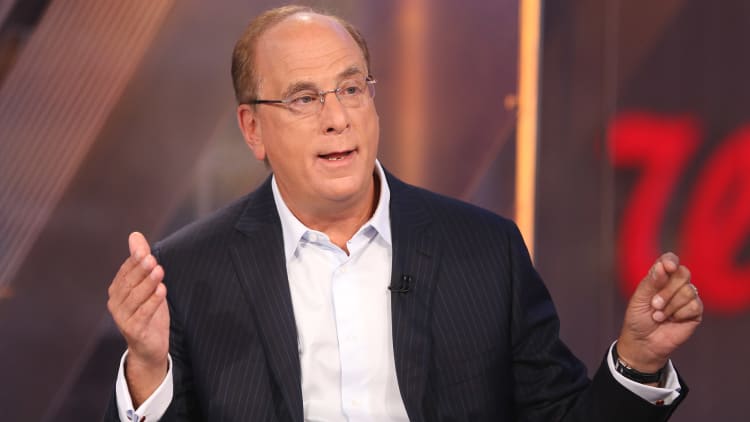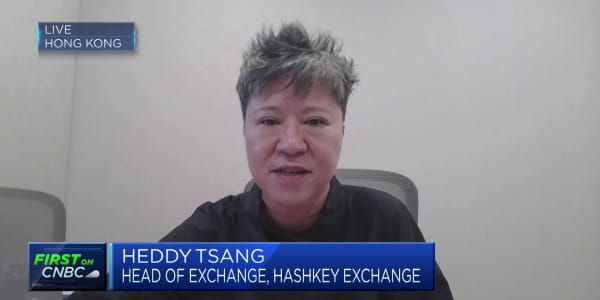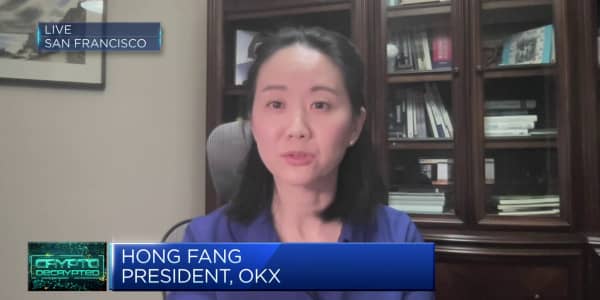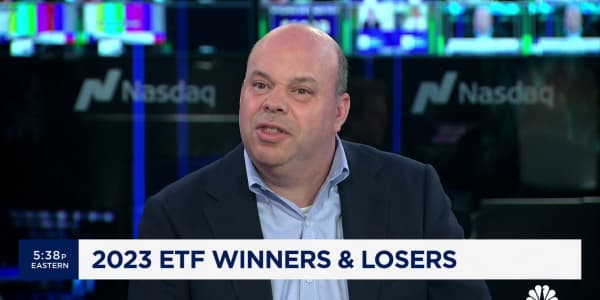BlackRock, the world's largest asset manager, handling more than $6 trillion, is leaving no stone unturned in its effort to shore up the investing dollars of the millennial and Gen Z generations. Having already made inroads in the robo-advisor business in recent years, BlackRock is coming for your nickels and dimes next.
BlackRock announced Wednesday that it has led a $50 million investing round in microinvesting site Acorns. BlackRock declined to say how much it had specifically invested in Acorns. The personal finance app allows customers to automatically invest spare change from everyday purchases, such as those made via credit card transactions, in exchange-traded funds from BlackRock and Vanguard. BlackRock's chief marketing officer, Frank Cooper, was also given an "observer seat" on the start-up's board.
Acorns said the investment options available on its platform will remain the same. To date, Acorns has signed up more than 3.3 million investment accounts, and also offers an automated retirement account.
"Acorns is a pioneer in creating innovative ways to engage investors in a mobile-first world. By deepening our understanding of how their customers use investment technologies, we can apply those learnings across BlackRock to evolve the products we build for our distribution partners," said Rob Goldstein, BlackRock's COO, in the deal announcement. "Through micro-behaviors the next generation of investors can take achievable steps towards building their well-being," he added.
Noah Kerner, CEO of Acorns, referenced the recent annual letter from BlackRock founder and CEO Larry Fink in the release, saying, "I can't think of a better collaborator on this journey."
In the letter, Fink voiced a strong view on how the lack of adequate or underfunded retirement plans can negatively influence world events: He tied the recent rise of populism around the globe directly to insufficient savings.

"The longer we wait, the deeper and more complicated the problem becomes. We are already at an inflection point: The deep populist sentiment around the world is driven by frustration and fear about the future — including the prospects for a secure retirement. We must find a solution. We cannot accept a system that excludes so many individuals from the benefits of investing, and political lethargy is not an acceptable excuse for leaving billions of human beings unprepared for retirement."
Fink wrote that as younger workers enter the workforce, they need to understand the importance of compounding returns and investing early in order to prepare for retirement. "A key goal is to help more people begin investing — for example, by building technology that makes it easier for them to learn about and understand the virtues of investing."
I'm not sure how many millennial investors using Acorns want to graduate to an advisor.Lex Sokolinglobal director of fintech strategy and partner at Autonomous Research
Lex Sokolin, global director of fintech strategy and partner at Autonomous Research, said BlackRock has been explicit about building out a digital wealth company of the future, and this move reinforces that strategy.
BlackRock already has an internal division focused on digital wealth, acquired robo-advisory start-up FutureAdvisor and is part owner of European robo-advisor Scalable Capital.
"It's not a surprise that they are continuing to invest in digital wealth solutions that could distribute their products," Sokolin said. "Today much of investment product distribution is done through advisors and financial planners. ... FutureAdvisor, Acorns, Scalable Capital are all different reimaginings of how people access financial advice and buy investment products."
He said all of these moves suggest that while BlackRock has a huge advisor-based sales business, the investing giant clearly wants to get closer to the consumer, directly through an app.
The FutureAdvisor deal allowed BlackRock to build out its institutional capabilities, private labeling the software to other RIAs and banks. But Sokolin isn't convinced that investors who start out by using an app to save will ever migrate up to an advisor. "I'm not sure how many millennial investors using Acorns want to graduate to an advisor. Acorns has strong traction and a large user base but is "DIY and [has] very low account sizes," he said.
Microinvesting is not a 'passing gimmick'
If there's a threat, some advisors welcome it.
Anthony Badillo, lead planner at financial advisory firm Gen Y Planning, said his firm favors robo-advisors, such as Betterment, for professional investment management over microinvesting applications. But he said the concept of Acorns is "truly revolutionary," rather than a "passing gimmick."
"Everyone understands the concept of saving loose change, but not everyone understands the concept of investing," Badillo said, adding that microinvesting apps increase investment exposure, education, and awareness among younger generations.
He said while the BlackRock iShares family of ETFs is a dominant force, not many young investors can reach investment minimums which are around $10,000 for managed accounts. "Acorns solves that issue, and most in the industry know about the $30 trillion transfer of assets that will occur between boomers and millennials."
Gen Y Planning does make sure that microinvesting is right for each client, which in many cases it may not be. If they have credit card or student loan debt, paying that off before microinvesting makes sense. The same goes for building an emergency savings fund to fall back on in the case of job loss or a major medical emergency. And if clients already have an employer retirement plan, that could eliminate the need for microinvesting.
Sokolin said the investment creates a hedge for BlackRock in case millennials rely on apps and chatbots instead of advisors, while BlackRock keeps distributing its product through RIAs or otherwise. The fintech expert added that the economics for these start-ups "don't really work yet, but applying BlackRock's scale could fix that. And that's how you would justify the high investment price."
Microinvesting sites like Acorns have been dinged for the management fees they charge, but Gen Y Planning's Badillo doesn't think that's a significant issue. "I'm not all that concerned about the $1-$2 monthly fee that Acorns charges. Yes, it will be a higher percentage of the assets that they actually have invested in Acorns in the beginning. However, over time, this fee becomes smaller as their balance grows. ... I can think of far worse things that our younger demographic is willing to spend $1 or $2 a month on," he said.
Fink wrote in his annual letter that broad incorporation of behavioral tools, such as auto-enrollment, which automatically enrolls individuals in workplace retirement plans, and auto-escalation, which can help individuals enhance their savings by periodically increasing contribution levels, will be key to the company's future.
BlackRock and Acorns said they will be focused on developing investing tools in collaboration to encourage the "savings and investing behaviors of the next generation of investors."
Acorns is not the only microinvesting app. Another popular one is Stash, which lets investors open an account with $5.
More from ETF Spotlight:
Jack Bogle slams ETF investors (sort of)
What to do if you're not Warren Buffett and don't see every stock as a buy
Elon Musk teaches — and learns — a lesson about long-term investing
Story updated to include comment from Acorns that the investment options available on its platform, which come from multiple ETF providers, will remain the same after the BlackRock deal. Comments from financial advisory firm Gen Y Planning on microinvesting pros and cons have also been added.





